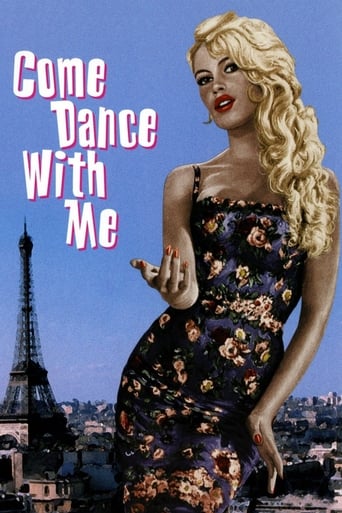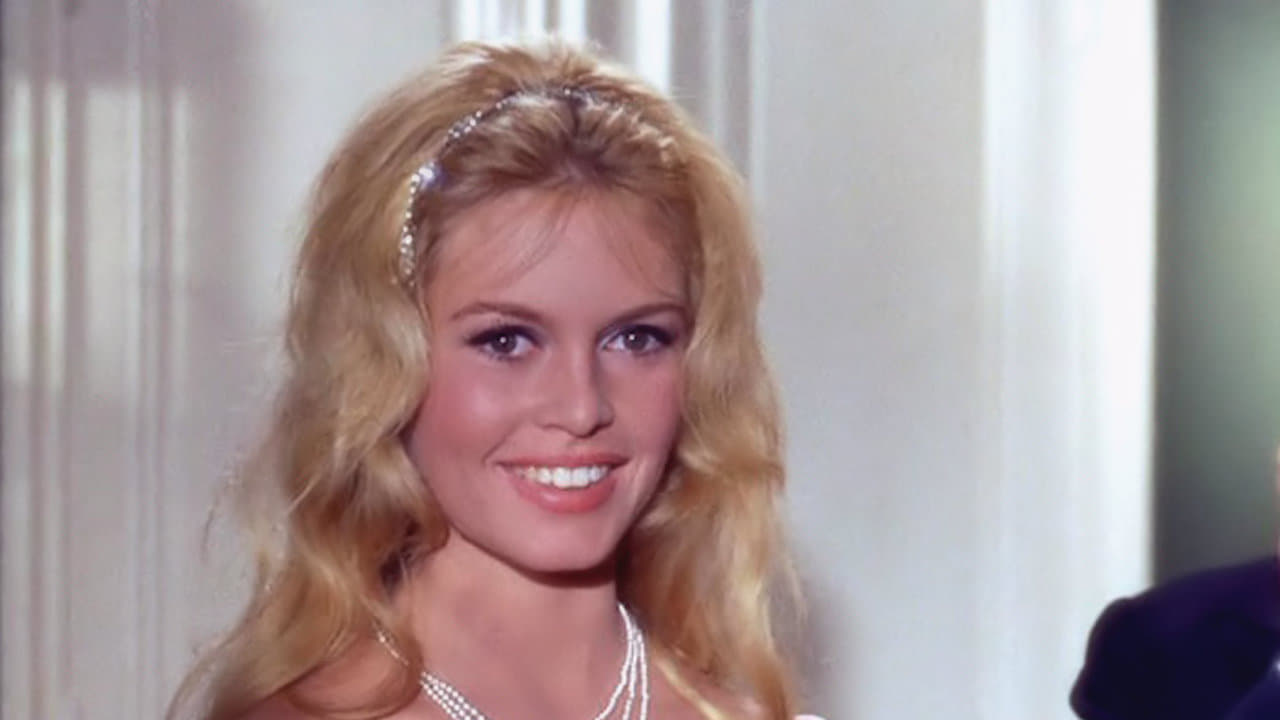dlee2012
Come Dance with Me is an odd film, more reminiscent of one of Alfred Hitchcock's lighter moments, in particular, his collaborations with Cary Grant. The character of her husband, though, does little to solve the mystery, making him an anti-Cary Grant as his wife, played by Bardot is the key figure in solving the mystery.Of course the point, towards the end, when the film deals openly with a dark and sordid homosexual subculture differentiates it from the English and American cinema of the day which would never have tackled such a topic so openly.(On that note, it is worth mentioning that the film may sit uncomfortably with those viewers in favour of homosexual rights today as the subculture is shown to be depraved and, ultimately, murderous. Those not in favour of homosexual rights will find that it shows the seedy world of the gays in a direct, unsanitised fashion that stands in contrast to the current climate of political correctness.) The acting throughout the film is stiff and it is unclear at times whether this was meant to be a comedy or a light drama. One is disappointed that the potential for a locked-room mystery is quickly dismissed only to be delighted as more twists are introduced showing that the case is more complex than it first appears.(As an aside, on the topic of locked room mysteries, Bardot makes some delightful references to France's most famous fictional novel of that type, Leroux's Mystery of the Yellow Room.) Of course, there is little character development in a film of this type and the acting is never particularly strong but there is a breezy feel and the performances are competent. Most notable is a cameo by a young Serge Gainsbourg as a sinister blackmail co-conspirator.There is little in the way of adventurous cinematography but the setting of Bardot's house would have seemed strikingly modern at the time and the use of light colour helps, once again, emphasise the bright mood of this piece.In contrast, the homosexual club is shown to be a dark, seedy place and Bardot stands out as a radiant figure surrounded by the depraved clientèle.The use of flashback to reconstruct the murder at the end is a solid, if timeworn technique.Some aspects of the plot's construction make little sense, however. The fact that the husband is a dentist never seems particularly significant, nor does the dance hall setting. A slightly tighter structure and more emphasis on the symbolic would have lifted this film's rating quite significantly.In conclusion, this is a straightforward film with a light-hearted feel that takes a sudden dark turn towards the end. The murder mystery is quite clever and deals with a sordid underworld rarely depicted in film at that time. The abrupt change of tone is somewhat problematic, though. Bardot is the key figure as she adopts the role of an amateur detective and though it may not be a role best suited to her, she does a credible job. There are enough plot turns after the initial expectation of a locked-room mystery is dismissed to keep the film interesting and there is a strong late-1950s French atmosphere invoked throughout. Recommended.
wvisser-leusden
"Voulez-vous danser avec moi?" (= French for 'do you want to dance with me?'), shows competent acting in a well-built crime plot.Set in color in the late 1950-s, this film openly deals with the Paris homo & travesty scene. Which was pretty groundbreaking for the staunch Roman Catholic France of those days.Brigitte Bardot's appearance in "Voulez-vous danser avec moi?" shines all the way down. Showing off her dancing talents (you may know Brigitte qualified at the Paris conservatory as a classical ballet dancer). While shooting this film, Brigitte was pregnant with her only child -- according to some this shows off in her advantage as well. The third show-off is made by Brigitte's dress in a cross-striped pattern - known to this day in fashion as the 'Brigitte Bardot - design'.In spite of her dazzling appearance, one cannot escape the conclusion that Bardot plays the wrong part here. Apart from being beautiful, Brigitte has a definite talent for light comedy. Acting crime & mystery just isn't her trade.My last words should be for male lead Henri Vidal. In December 1959, aged 40, he died from a heart attack. This happened shortly after the completion of "Voulez-vous danser avec moi?".
gridoon
"Come Dance With Me" was probably meant as an airy mystery-comedy, but it's mostly stage-bound and talky. What's more, I guessed who the killer was (though admittedly not his motive) 15 minutes into the film, and if you've ever read even one Agatha Christie story before, you'll have no problem guessing it, either. This being a French film, it is slightly more sexually explicit than most American films of the period: we see a woman's (no, not Bardot's) bare nipple, and (heavy SPOILERS follow) the killer turns out to be a transvestite. Bardot's "amateur detective" role is somewhat of an acting stretch for her (her character has more functions than simply looking pretty and teasing men), but I still feel that for many viewers her scenes in a revealing black dress will be the most memorable ones. (**1/2)
Neal
The murder mystery plot is pretty limp, but Bardot is at her ripest and performs a joyous mambo. The gay subplot would have been unthinkable in a Hollywood film of the time; here the treatment is relatively casual and benign. The title song is a finger-snapping delight; how could it have escaped Bobby Darin's attention?


 AD
AD



